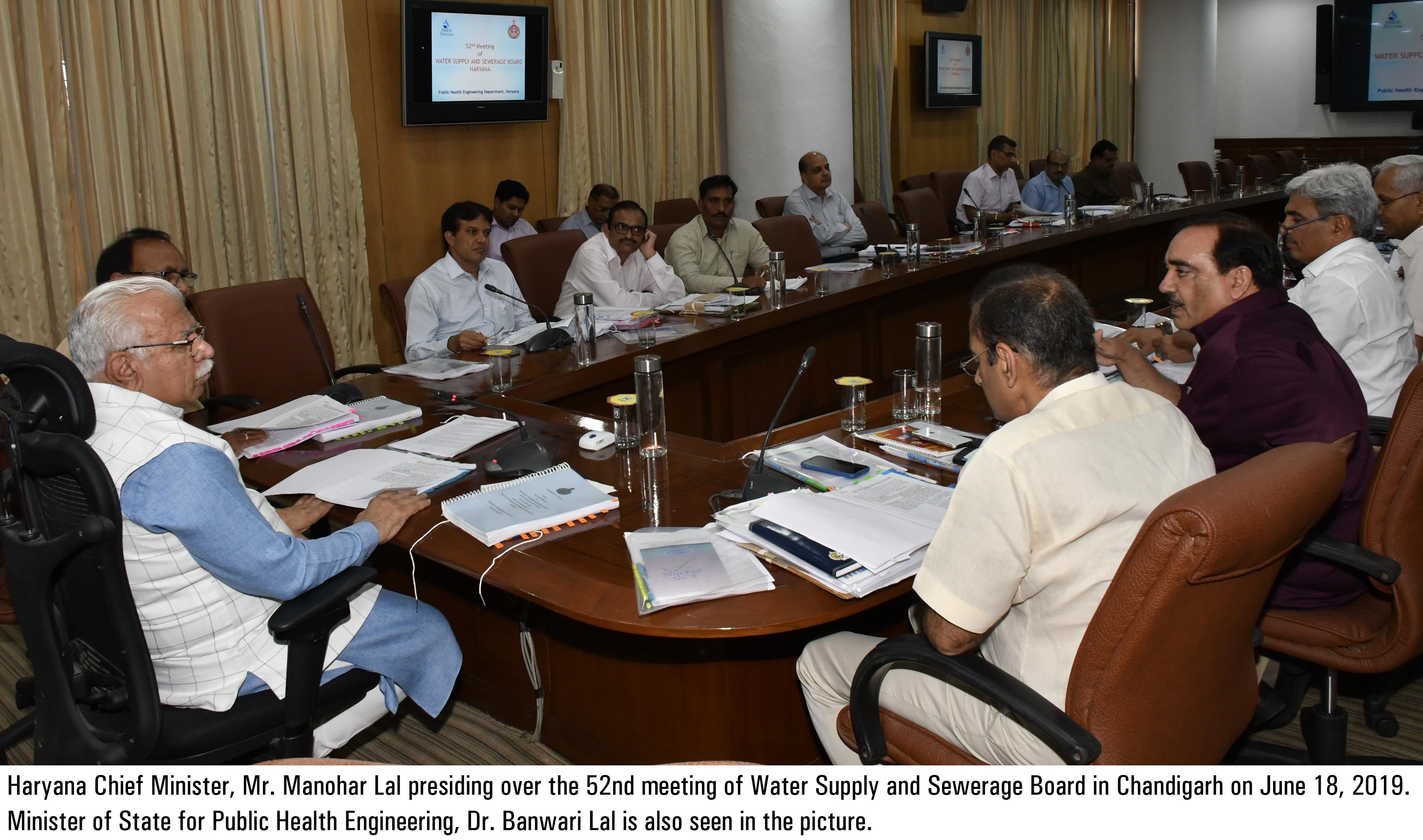
Chandigarh, June 18: Haryana Government has decided that villages having less than 10,000 population and desirous of having more facilities like augmentation of water supply and sewerage would be covered under the Mahagram B category.
A decision to this effect was taken in the meeting of 52nd meeting of Water Supply and Sewerage Board which met under the Chairmanship of Chief Minister Mr Manohar Lal here today. Minister of State for Public Health Engineering Dr Banwari Lal was also present in the meeting.
The Chief Minister said that at present 126 villages of over 10,000 populations are being covered under the Mahagram Yojana. Facilities like augmentation of water supply, sewerage and setting up sewerage treatment plant are being provided under the scheme. He said that recently people of various villages have approached him with a request to carry out these development works in their villages also under the scheme for which they have also offered to contribute funds.
He also directed that besides providing training to the sewer men, they should also be provided with necessary equipment, uniform and kit so as to prevent any untoward incident of suffocation while cleaning the sewer. He directed that only trained sewer men should be allowed to enter into the manholes.
It was informed that training of 703 sewer men has been held at different locations covering 14 circles of Public Health Engineering Department. It was also informed that three robotic machines are being purchased by the department for cleaning manholes. On the successful trail run of these machines, more such machines would be purchased.
In the meeting, the Board approved a sum of Rs 145058.92 lakh for improvement of drinking water supply facilities, sewerage system in the rural and urban areas and storm water drainage facilities in urban areas. Apart from this, funds were also allocated for 4027 ongoing schemes and 694 new schemes. It was informed that a sum of Rs 40438.25 lakh has been earmarked for improvement of drinking water supply and providing sewerage/stormwater system in urban areas whereas, a sum of Rs 102220.00 lakh has been earmarked for improvement of drinking water supply and providing sewerage system in rural areas.
It was also informed that during the year 2019-20, a target has been fixed to improve drinking water supply facilities in 292 habitations of rural areas and in the urban areas, construction of 5 Sewage Treatment Plants and improvement of water supply, sewerage/storm water drainage system in various towns of the State.
While emphasizing the need to save water, the Chief Minister directed the Public Health Engineering Department to take the water conservation and re-cycling of waste water as a mass movement and also include all village Panchayats in this drive. He said that during the meeting of NITI Ayog held under the Chairmanship of Prime Minister, Mr Narendra Modi in New Delhi recently, the Chief Minister of various States appreciated him (Mr Manohar Lal) for implementing ‘Jal Hi Jeevan’ Scheme in Haryana’ aimed at water conservation.
He directed the Urban Local Bodies Department to prepare a scheme for the storage of waste water of bathroom or washroom using tanks and reuse the same for flushing in toilets. He said that the State Government would also provide subsidy on water tanks used for this purpose. He also directed to explore the possibilities of using portable actuator with a block valve on drinking water distribution network in villages to minimize the wastage of water.
Earlier, the Board approved various works for the rural areas. These included 272 new tube wells, 11 independent canal based water works in villages namely Bhada-Khera, Naurangabad, Santor, Bohla, Kheri Roj, Nangal Pathani, Qutabpuri Buzag, Balawas Ahir, Lisana, Nayagaon and Khrampur. It also approved 5 boosting stations, 3 renovation and repair of existing water works, 25 pipelines works and 25 other works including augmentation of existing water works, independent feeders, sustainability, raw water arrangement etc in rural areas.
Similarly, various works were also approved for the urban areas. These included improvement or augmentation in urban water supply in towns namely Ambala Sadar, Barara, Chhachrauli, Pinjore, Pehowa, Rampur Seri (Kalka), Yamunanagar, Kaithal, Kurukshetra, Indri, Gharaunda, Narnaund, Nilokheri, Kalanwali, Tohana, Bahadurgarh, Hansi, Indri, Nissing, Tarori, Narnaul and Sampla. Apart from this, new works for existing sewerage system in towns of Pinjore, Jind, Narwana, Ismailabad, Nilokheri, Kalanwali, Rania, Kosli, Firozpur Jhirka, Hodal, Hassanpur and Meham were also approved. In addition, new works for upgradation of Sewerage Treatment Plants for providing Tertiary Treatment Plants (TTP) at Sirsa, Uchana, Punhana, Uklana, Kosli, Narnaul, Ateli and Kanina were also approved.
Among those present in the meeting included Principal Secretary to Chief Minister, Mr Rajesh Khullar, Additional Chief Secretary Public Health Engineering Mr Rajeev Arora, Additional Chief Secretary Power Mr T.C Gupta, Additional Chief Secretary Finance Mr TVSN Prasad, Principal Secretary Urban Local Bodies Mr Anand Mohan Sharan, Engineer-In-Chief Public Health Engineering Mr Manpal Singh and other senior officers of the State Government.



